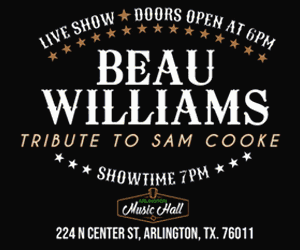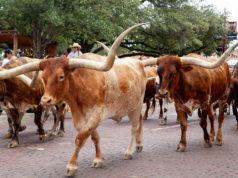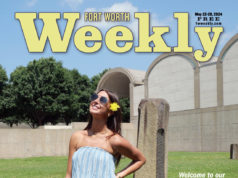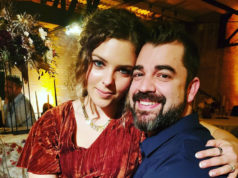Like a lot of establishmentistas in Texas – you know who they are – mixed-media artist Benito Huerta is above criticism. Not a discouraging word uttered outside the pages of maybe ArtForum would leave the tiniest smear on his past, present, or future. Definitely, nothing we plebes could say would take away the Artist Legend of the Year award that he received from the Dallas Center for Contemporary Art in 2002 or his associate professorship at the University of Texas at Arlington or his co-founding of the muscle-car-‘n’-bikini-model quarterly ArtLies. (Just kidding. ArtLies delivers some of the most insightful art criticism in the entire Southwest.)
But since criticism also serves another master, history, let’s go on the record as saying that Huerta tends to mistake the simplistic for the purely simple. The result is work that’s openly institutional in both scope and execution: a lot of often esoteric, pseudo-edgy symbols, a lot of neatly arranged imagery, a lot of, well, boring colors, nothing vibrant and shocking, nothing unnaturally – and enticingly – ambiguous. In other words, a Huerta is perfect for above the sofa or behind a branch manager’s desk.
The establishmentista’s latest show, Grand Illusion, at William Campbell Contemporary Art until early February, tests the limits of the Yawn-O-Meter. Nearly all of the images are the same: a map (or simulacrum of a map) of a portion of the Texas-Mexico border, a photocopy or real piece of U.S. or Mexican paper currency, found images of Hindu iconography, and great, monochromatic plains of hollow hues. In burlesque, the tease is arguably the most important part of the show – our imaginations are allowed to fill in the, uh, blanks. In art, a tease, especially one predicated on apparently random symbolism, is borderline cruel – and not in a cathartic, early Andres Serrano way.
Grand Illusion is an odd title for a show that offers little to no retinal effects. Two similar pieces opposite each other in the gallery’s small room have zero impact on the space. They don’t shrink it. They don’t enlarge it. They’re just … there. The show’s title clearly refers to the wall texts: The pieces, “Sin Titulo #1: Declaration of Independence” and “American Notations #14,” are priced at – don’t laugh – $13,000 each.
Swallowing nearly one entire wall is the show’s signature piece, “Sin Titulo #5,” a massive, hastily painted brown canvas whose immensity is punctuated by the presence of three quiet symbols, each no bigger than a dimestore novel cover: a photocopy of a 10-peso banknote, a painted reproduction of a loteria card (“El Corazon”), and a neatly framed opening adorned by transparent, plastic beaded strings. The piece looks like it weighs a ton.
Ultimately, what you get with Grand Illusion is a wry smile, a playful uneasiness. None of the handiwork is really convincing. Even Huerta’s loteria cards – some are made up, others based on actual “Mexican bingo” cards – fall flat, even though he has clearly devoted at least some elbow grease to them. A good work of art doesn’t have to look like it took 10 years to make. But if an artist’s hand is as considerably removed from his artistic endeavor of the moment as Huerta’s is here, some residual sweat equity certainly wouldn’t hurt.
At Fort Worth Community Arts Center, the ennui eases up a bit, thanks mainly to the charged atmosphere. For the past two years, Fort Worth CanDo, a nonprofit organization devoted to combatting urban gas drilling, has put on Buzzworms in the Backyard, an awareness-raising group show. Most of the pieces are heavy-handed. One of the cheekiest is the venerable Carol Ivey’s mixed-media assemblage. In “Energy Drink,” she reconstitutes the sludge created by fraccing as a sports drink. Ingredients, according to the text on a handy sheet of posterboard, include “respiratory toxicants,” “carcinogens,” and “endocrine disruptors.” A plastic bottle bearing the name of one of the leaders in urban gas drilling, Chesapeake Energy, contains what we must presume is actual fraccing sludge. Gag.
The two best pieces overall – and, incidentally, both of which look as though they took 10 years to make – are untitled sculptures: one by Michael Picchiottino, the other by Jonathan Sanders. Picchiottino’s spherical assemblage of twisting, intersecting ribbons of rusty steel could be Vulcan’s armillary globe, while Sanders’ bleak construction could have come from an assembly line in hell. An angular riot of steel, rebar, cables, chains, gears, and more, set on a concrete base, Sanders’ piece, at its most innocent, looks like an Orwellian sewing machine. In place of a needle, however, there is what appears to be a gas pump – the whole thing, like the best art, merely suggests functionality. From the narrow side, the monstrosity resembles some sort of dystopian-gothic cathedral, like a Léger but in 3-D and in black and white. Viewed full on, Sanders’ grimy “Untitled” is as inert and clamorous as a lingering bad memory.
The pictorial meanings in Buzzworms’ less didactic entries are chaotic – you can read as much or as little into them as you like. But the serious context in which they are set is open-eyed and unyielding. – Anthony Mariani
Cattle Call
If the compulsion to create live theater were expressed as a bumpersticker slogan, it would read: “Theater artists will do it anywhere.” The availability, cost, and adaptability of stage venues is a constant issue for even established theater companies. Consequently, North Texas productions have been staged over the years in basements, attic spaces, parking lots, bars, living rooms, and in a pitched tent on a hillside.
The Butterfly Connection has amiably departed from the Rose Marine Theatre to begin staging shows at its own space, a recently refurbished, 1,300-square-foot storefront at 7001 E. Lancaster Ave. Butterfly co-founder and artistic director Adam Dietrich notes that his neighbors include a tax office and a photography studio and that their block is on the edge of the spiffy Handley neighborhood redevelopment.
“I want to communicate to people before they come that this is not a traditional theater space,” he said. “The seating is 40 or so plastic chairs we borrowed from [local nonprofit] Pantagleize Theatre. The ceiling is not a theater ceiling. But we’re hoping to inspire people to create smaller, performance art-style theater pieces in non-traditional places.”
The Lancaster location also houses Butterfly’s offices and a suite of nine donated computers that’re tricked out with “major RAM,” Dietrich said. Among other amenities, there is software to edit movies shot on digital video. Dietrich wants to continue Butterfly’s multi-media bent as well as work with outside student and professional filmmakers to create Fort Worth-focused work.
On the theater side of things, the company is hosting its annual “cattle call” auditions for the 2009 production year this Saturday, from 10 a.m. ’til 2 p.m. Among the shows under consideration are two Butterfly mainstays, Rainbow Country: The Life and Death of Bob Marley and My Brother and Sister With Wings, as well as new adaptations of a pair of Twilight Zone episodes, the Neil LaBute squirmer Fat Pig, the prison pedophile drama Short Eyes, and a new comedy with a cross-dressing hero called The Sephina Suffix.
“We’re not necessarily doing all of those shows this year,” Dietrich said. “We’re going to see how the talent connects and build the shows from there. Productions will be announced three weeks before [opening nights].”
Actors interested in auditioning should bring a headshot and resumé and prepare a two-minute monologue and 16 bars of a cappella music. Improvisational and movement exercises will be performed as part of the audition. Butterfly also is seeking musicians, visual artists, puppeteers, stage managers, lighting designers, and anyone else with the skills to help mount a show. Non-actors should make an appointment by sending an e-mail with “audition” as the subject to adamjdietrich@gmail.com. – Jimmy Fowler











